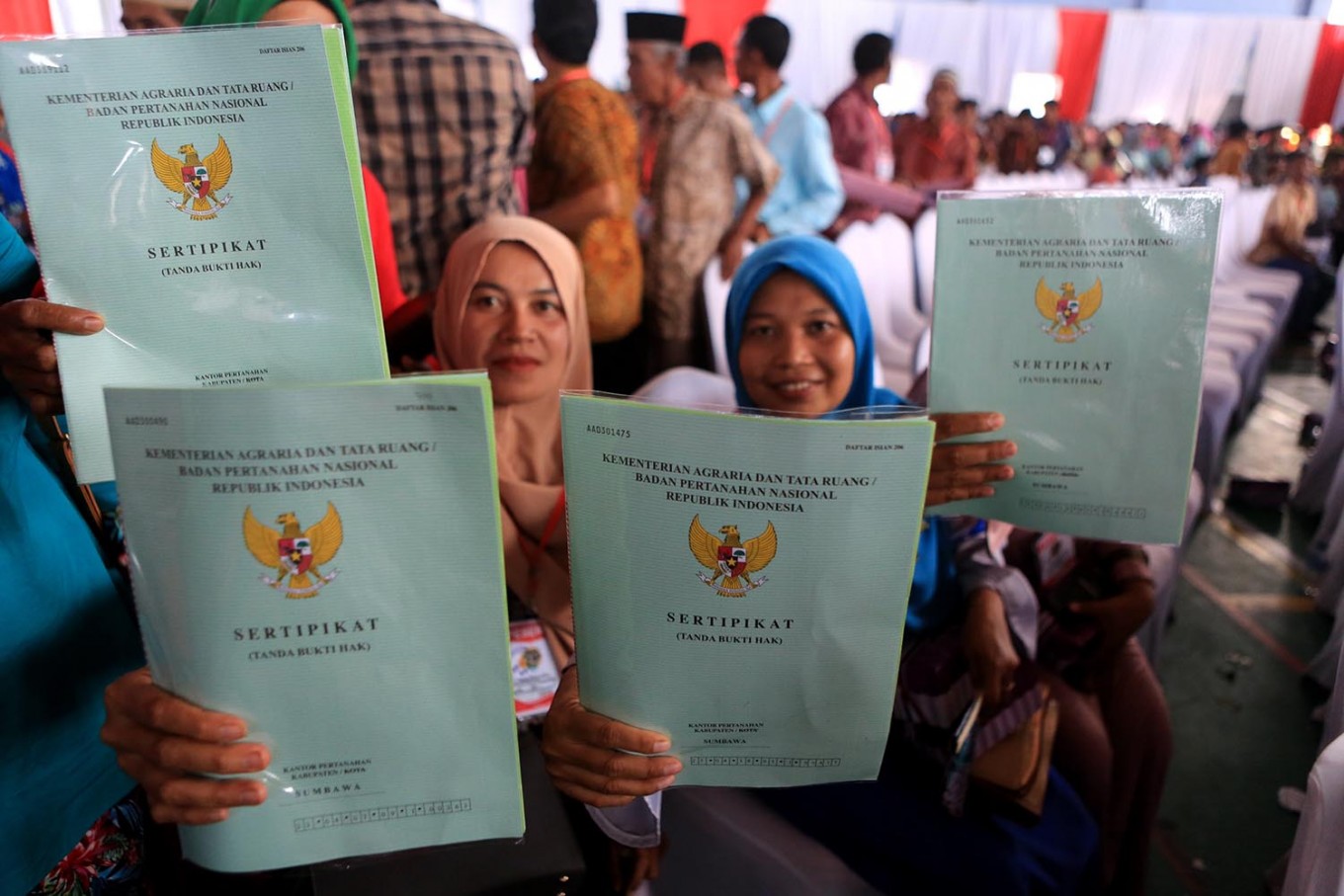Popular Reads
Top Results
Can't find what you're looking for?
View all search resultsPopular Reads
Top Results
Can't find what you're looking for?
View all search resultsLandownership 4.0 to unblock industrialization hurdles
Successful industrialization depends on the capability of a nation to establish institutions compatible with the increasing quality of human resources. One trend which needs to be corrected to achieve that goal is Indonesia’s inequality in landownership.
Change text size
Gift Premium Articles
to Anyone
T
he persistent deficit in our current account reflects limited capacity to finance necessary imports of goods or services. There remains only one option to finance imports, through increasing national debt. However, if the debt utilization does not create higher returns relative to its repayment costs, it would generate a vicious circle of involution that will imperil national sovereignty, as was the Indonesian case in 1997.
Successful industrialization depends on the capability of a nation to establish institutions compatible with the increasing quality of human resources. One trend which needs to be corrected to achieve that goal is Indonesia’s inequality in landownership.
In principle, the pattern of Indonesia’s balance of payments (BOPs) has remained unchanged since the Dutch era. Our economy has been dependent on foreign debt but sadly our exports still comprise low value products. From a recent study by University of Indonesia economist Telisa Falianty we could see that BOP is a measure for enhancing economic growth and supporting industrialization.
Current account trends of Malaysian and Indonesian BOPs reveal similar patterns during 1974-2002. During 2002-2009, the current account of Malaysia increased four-fold from a surplus of almost US$10 billion in 2002 to almost $40 billion in 2009. However, within that same period, Indonesia’s current account oscillated between zero to up to about $10 billion.
Furthermore, since 2009 up to 2016 both countries have faced significant decline in their current accounts. However, the current account of Malaysia still registered a surplus whilst Indonesia’s slumped into a deficit of about $17 billion.
The current account deficit and the structure of the economy are two different sides of the same coin. Apparently Indonesia has not been able to emulate either Japan or South Korea, and it is still unclear in which direction Indonesia will evolve.
Historically, Malaysia’s culture has been very close to ours. This implies that the way of thinking, feeling and behaving among us are relatively similar compared to other cultures. Development is actually a matter of cultural change.
In 2016, Malaysia scored +0.865661 in the Economic Complexity Index, a ranking developed by MIT Media Lab and Harvard University's Kennedy School of Government. Indonesia’s ECI, however, was far lower at -0.253646. With such ECI values the trade balances of Malaysia and Indonesia in 2017 were respectively $22.68 billion and $11.64 billion. Malaysia’s trade balance was almost twice that of Indonesia.
An insight into how Malaysia managed to perform so well was provided by Daniel Headrick in a 1996 edition of the Journal of World History 7, no. 1, among other sources. Malaysia has successfully shifted its culture from one showing a dearth of scientific enlightenment to one exhibiting scientifically founded social or cultural values and behavior. This was explained by Malaysia’s per capita expenditure on agricultural research and development which was higher than that of the United States.“ Malaysia has shown that tropical nations can compete if they invest in research,” wrote Headrick.
Our economic development trajectory shows that we have not been able to move up to a higher state.
Observing the values of exports of manufactured products during 2011 to 2017 we see that the net weight of goods exported went from 63.8 million tons to 89.8 million tons, an increase of 40.7 percent, but its value only increased by 0.9 percent. Sadly, this implies that in real terms our exports have been deteriorating.
Lack of success in industrialization places a heavy burden upon agriculture. Its impact is shown by declining farm land size, registering an opposite trend to that of developed countries. The continuing process of peasantry of Indonesia’s agriculture will endanger our food security . The massive societal burden of stunting and neglected infection from tropical diseases appear to be highly correlated with lack of progress in industrialization.
Recent literature shows that the most important factor to determining development is the quality of institutions.
According to scholars one of the most important institutional setting that is blocking the emergence of a suitable process of development, e.g., along with better institutions and higher quality of human resources, is inequality in landownership.
We have inherited institutions that are creating huge inequality in landownership, namely Hak Guna Usaha (HGU), the right-to-cultivate permit, the 1870 agrarian law. The basic idea in this law of the colonial era is that the state provides large landholdings to private companies with a new status of ownership called use right or HGU.
This right permits the owners to use the land as collateral to banks or to sell it to other parties, because now it is considered a company asset, beyond the mere right to use the land.
Within this regime of landownership, for example, there are over five million hectares of palm oil plantations concentrated in the hands of conglomerates. As a consequence, millions of farm households face diminishing holdings.
We badly need a “landownership 4.0” regime, to create a process engendering a high quality of institutional development and human resources. This is should be the main focus of Indonesian development at the current stage.
***
The writer holds a Ph. D in agricultural economics with specialization in natural resources.










